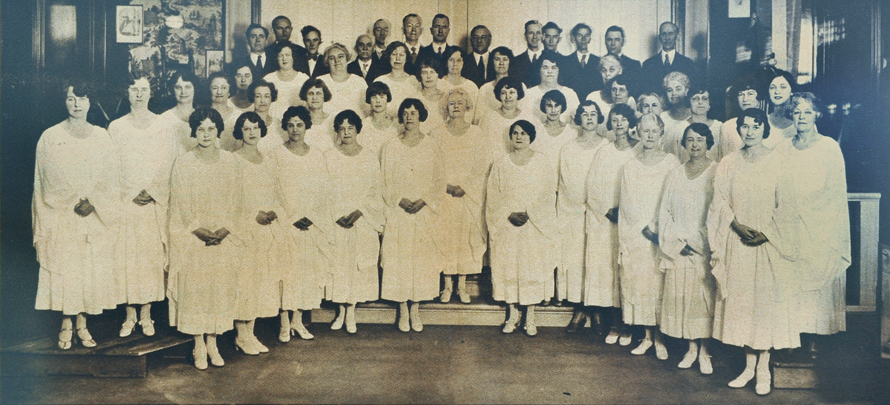By the turn of the 19th century live music in stores played a prominent role including in-store performances by choruses and bands made up of store employees.
The Dry Goods Economist, one of the most important trade publications for American department stores of the time largely motivated the idea encouraging leisurely shopping.
Music's range of cultural associations worked to the retailers' advantage by investing the stores with excitement and drama, by imbuing commonplace goods with luxury and status, and by encouraging leisurely shopping among women. - Linda L. Tyler, Journal of the American Musicological Society
Members of Marston Choral Society
Sopranos: Helen Rinde, Jean Douden, Lucy Eldridge, Nellie Haenke, Mary Comeau, Georgina E. Andrus, Mabel Skain, Nell S. Brown, Margaret Vellner, Helen Brown, Bertha Shiller, Hertha Togel, Florence M. Mullineaux, Carrie Greenwood, Laura Thordarson, Emma M. Davenport, Ann Noonan, Mary Taylor, Jean Hanna, Dorothy Williams, Frances Schumann, Dorothy Winke, Lillian Layton, Rae Ireland, Eloise Treganze. Altos: Laura J. Easterday, Jennie E. Smith, Olga C. Pearling, Lena B. Sears, Delia May Taylor, Mary Malton, Mayme Sites, Agnes Carter, Myrtle Conkle, Grace Westland, Cora Hunt, Alberta Widen, Ula Maie Durham, Rut Hall, Evalene Hart. Tenors: Benjamin Edmundson, John H. Herris, Lawrence Shaw, ARthur Stewart, Andrew Pearsal, Lloyd Peterson, Harry Divett. Bassos: Edward Alcott, Samuel h. Jory, Charles P. Ross, Walford M. Hodding, Harold C. Barrett, James Ricker (a Marston's delivery driver as well), Charles A. Moore. Director: Wallace Moody. Accompanist: Mrs. Wallace Moody.

Courtesy Marston Family Collection |